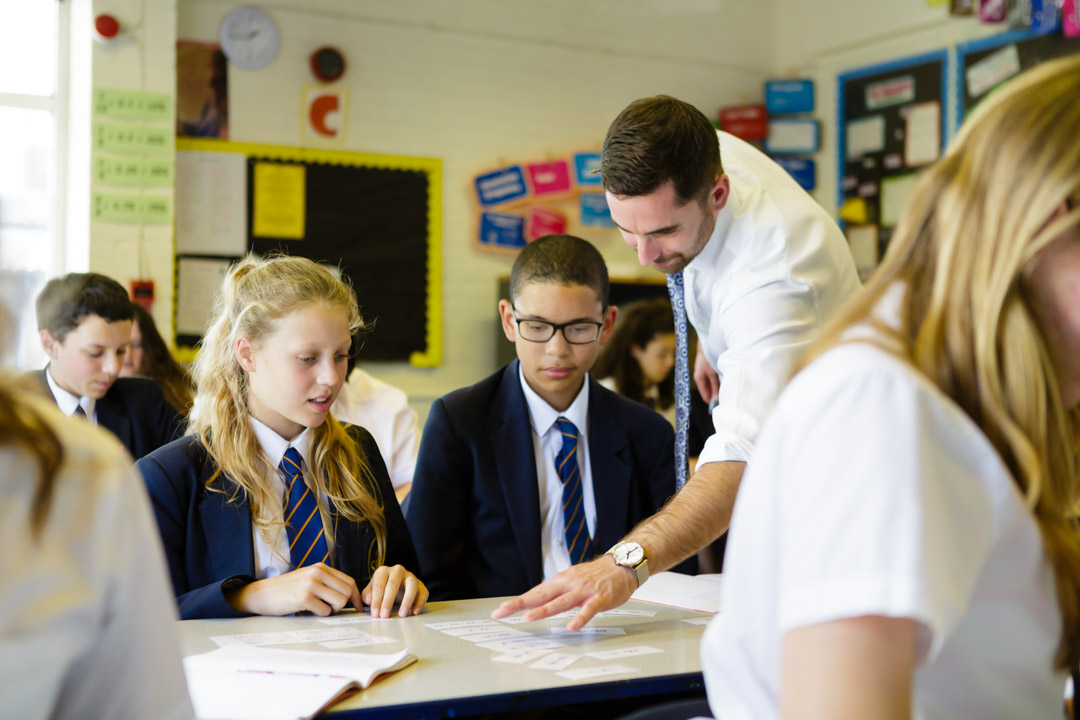
Developing a deep understanding of mathematical concepts among secondary pupils isn’t easy. The teaching for mastery programme provides school to school support, resources and professional development to help teach maths in an way that builds knowledge systematically and in depth. This allows students to see the connections between topics and build up knowledge of maths as a cohesive whole.
Becky Shepherd, Head of Maths at St. John the Baptist School in Surrey, tells us about the huge impact the teaching for mastery programme has had on their pupils.
Growing our pupils’ confidence
We embraced teaching for mastery in the maths department at St. John the Baptist four years ago. All students are encouraged by the belief that by working hard at maths they can succeed and that making mistakes does not mean you have failed but rather provides a valuable opportunity for learning. One of the underpinning ideas of teaching for mastery is the rejection of the perception that some pupils “just can’t do maths”. For us, this is one reason why we have never looked back since embarking on the programme.
What do mastery lessons look like?
Mastery is achieved through developing procedural fluency and conceptual understanding within each topic studied. Every lesson takes one key learning point and breaks it down so that every pupil understands the maths that they are doing. On top of this, pupils are challenged to reason and problem-solve so that their understanding of a topic goes far deeper than surface level.
A typical lesson:
1. Introducing the concept
Through teacher-student and student-student interaction, a new concept is explored, demonstrated and generalised.
2. Challenging misconceptions
From this, pupils are exposed to misconceptions and they are encouraged to discuss with each other why a particular wrong answer might have occurred.
3. Setting purposeful tasks
Pupils will then be set onto what is called intelligent practice. For us, this is where the greatest change has happened. Each set of questions which pupils work through are carefully crafted and are designed to shine a light on something new and encourage pupils to think about why that question has been chosen. We strongly encourage our teachers to avoid exercises of repetition and instead to make sure every question has a purpose and a place in a sequence of questions. We’ve found that pupils appreciate the importance of variation and are very willing to give reasons as to why particular questions might have been chosen as part of a larger task.
4. Teacher-led explanations
During this time on a task, a class teacher will support pupils who require a bit more explanation or challenge those who have picked up ideas quickly to push themselves a bit harder. A lot of pride is taken in the fact that we don’t accelerate higher attaining pupils onto a new concept. Instead, we ensure that they delve deeper into the current topic of study. For example, they might be asked to explore links between the current topic and a topic that they studied previously. One of the fundamental aims of teaching for mastery is to keep the whole class together and this is something we continue to work on.
Improving planning and reducing workload
When rolling out the programme, we were keen to make sure we lightened teacher workload. Planning a ‘mastery’ style lesson can seem daunting, and so, by sharing out the creation of resources and utilising what we already had, we helped to reduce workload. This also helped to promote consistency across classes in terms of what pupils were getting. To help with the planning, our fortnightly department meetings became much more focussed on learning and teaching which helped facilitate more discussion and shared planning around ‘mastery’ lessons.
The impact – increased resilience and reasoning
Much of the maths GCSE is now focused on problem-solving and reasoning, and therefore by ensuring that these elements are a key focus from day one in Year 7 – the impact is huge. We have found over the last couple of years that our pupils are becoming more resilient as problem solving has become an integral part to every single lesson – not just once a week. We have also found that the quality of mathematic discussion and reasoning that happens in a lesson between pupils is phenomenal – and this is something that is noticeably different compared to before rolling out the programme – purely because of the style of question that we now put in front of our pupils.
Introduce teaching maths for mastery at your school
Find out more about teaching for mastery or contact your local Maths Hub to get involved.